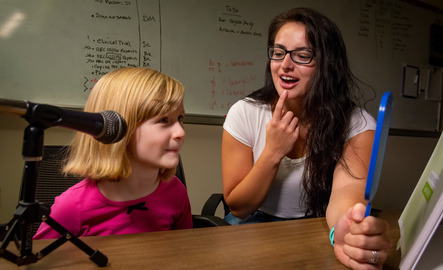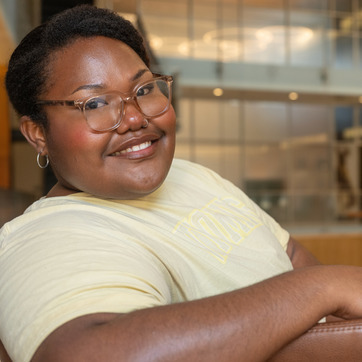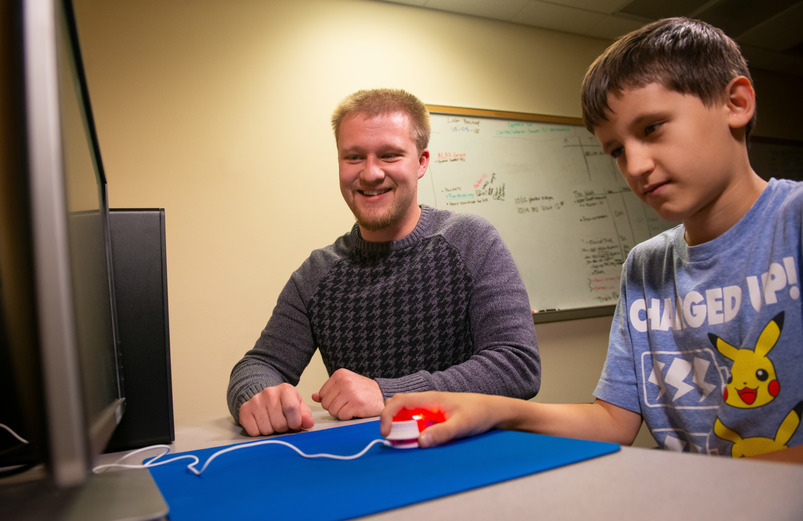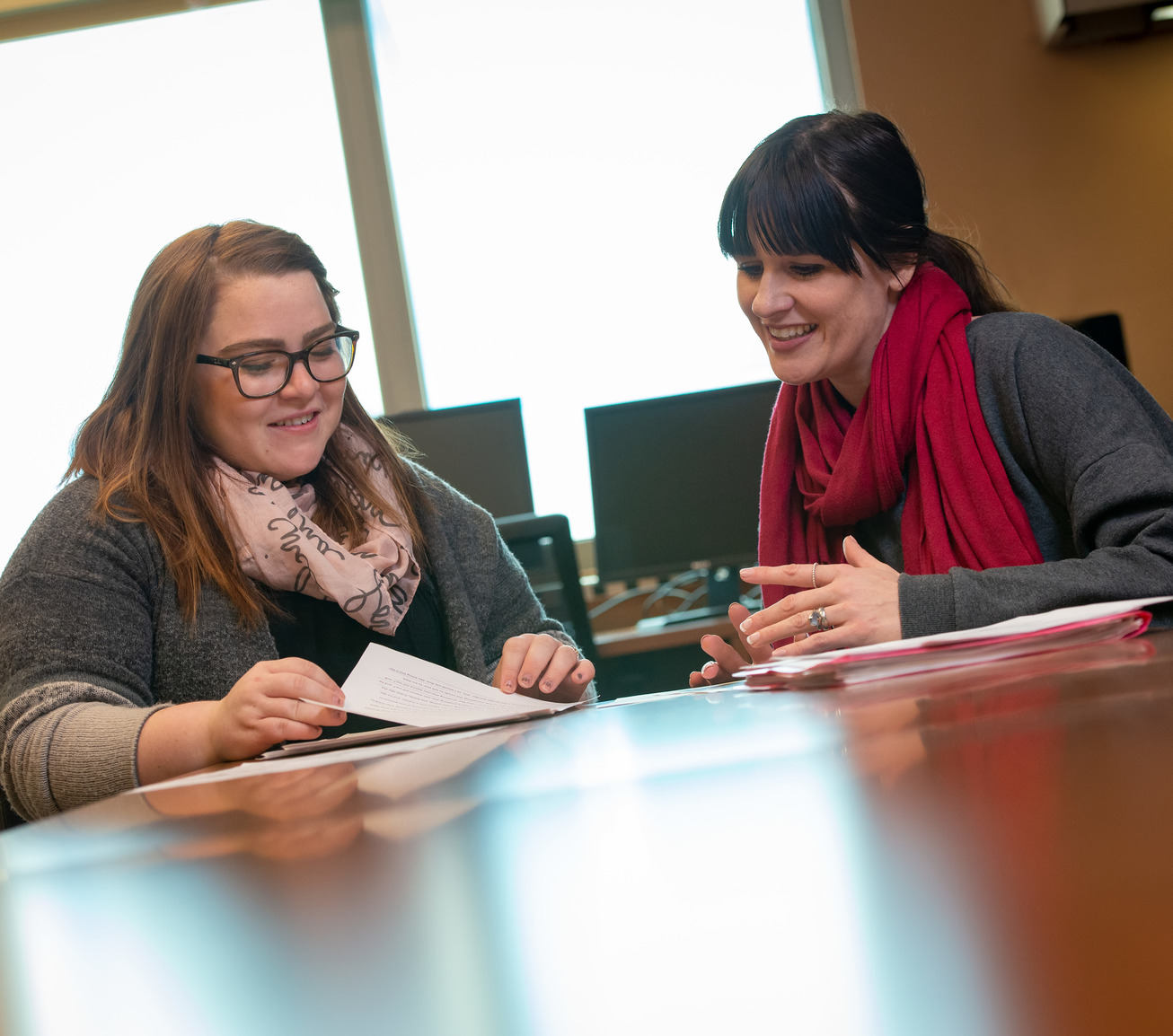About Our Exceptional Clinical Degree Program
The University of Wyoming's Master of Science in Speech-Language Pathology program
(MS-SLP) is a full-time, six-semester program, classified as a residential program
according to the criteria established by the Council on Academic Accreditation in
Audiology and Speech-Language Pathology (CAA). This program incorporates a online
education component, involving one semester of online coursework and off-site clinical
practicum, known as "community placement," completed during the fall semester of the
second year. Consequently, students in this program dedicate their "first year" (three
semesters) to on-campus studies and clinical practicum at the University of Wyoming
in Laramie. The "second year" (three semesters) consists of off-campus components,
with students engaging in online education coursework and clinical practicum during
the fall. Full-time externships are undertaken in the spring and summer of the second
year. While off-site clinical placements can be located anywhere in the United States,
it's important to note that students are matched to clinical sites by the Speech Clinic
Director, and existing agreements must be in place prior to students beginning their
placements. The combination of academic coursework and clinical experience allows
you to gain diverse and deep knowledge and skills to diagnose, prevent, assess, and
remediate communication difficulties and disorders.
On your path to becoming an SLP, you will learn about communication difficulties, such as voice disorders, speech sounds disorders, stuttering, language impairments and learning disabilities. You will also learn about communication and swallowing difficulties associated with neurological disorders such as strokes, head injuries, and developmental disorders.
You will be prepared to work with people across the lifespan, from infants to seniors, in diverse settings, including schools, preschools, hospitals, skilled nursing facilities, universities, and private practice. You will learn to diagnose speech and language disorders in children and adults, make recommendations for remediation, and provide direct intervention. Choose from either a thesis or non-thesis track. You can work with researchers investigating the nature and treatment of communication disorders, and conduct your own thesis research under the supervision of one of our PhD faculty members.
Both tracks in our master’s program for speech-language pathology lead to eligibility
for the Certificate of Clinical Competence in Speech-Language Pathology (CCC-SLP),
granted by the Council for Clinical Certification in Speech-Language Pathology of
the American Speech-Language-Hearing Association (ASHA). A supervised Clinical Fellowship
Year (CFY) is required beyond the graduate degree for MS-SLP clinical certification
of competence. After earning your master’s in speech-language pathology from UW, you’ll
also be eligible for the Wyoming license in speech-language pathology.

Admission to our program is contingent on the outcome of the background check and
students must submit MMR immunization to UW’s Student Health Services. Students should also know that external clinical placements often require updated
background checks and have their own processes and guidelines for vaccination documents
and requirements, these sites are not bound to the University of Wyoming determinations.

The Master’s of Science (MS) education program in speech-language pathology {residential} at the University of Wyoming is accredited by the Council on Academic Accreditation in Audiology and Speech-Language Pathology of the American Speech-Language-Hearing Association, 2200 Research Boulevard, #310, Rockville, MD 20850, 800-498-2071 or 301-296-5700.

Number of Terms and Modality for Speech-Language Pathology Master’s Degree Program
The Master's in Speech-Language Pathology is a full-time, two-year degree program consisting of ≈ 61 semester hours (SCH) of graduate study. The program is delivered in six consecutive semesters with full-time fall, spring and summer enrollment required. The program is classified as a residential program according to the criteria established by the Council on Academic Accreditation in Audiology and Speech-Language Pathology (CAA). This program incorporates an online education component, involving one semester of online coursework and off-site clinical practicum, known as "community placement," completed during the fall semester of the second year.

Students enroll in coursework while engaging in clinical practicum in the UW Speech & Hearing Clinic for the first three semesters. During the first year of the program, students are required to be on the UW main campus in Laramie, Wyoming.
Students complete online synchronous coursework in the fall semester, and an intensive “community placement." These community-based practicums can occur in Wyoming or another state as long as a cooperative agreement can be obtained and the site and student placement is approved by the University, the program, and the Speech Clinic Director. Students complete the oral comprehensive exam during the second year. During the spring and summer semesters of the second year, students engage in two full-time clinical externships in an educational and medical setting (arranged by the Speech Clinic Director). Externships occur throughout the U.S., generally at sites for which we have existent/formerly established contracts (most often in the Mountain-west region). At the bottom of this page, view the Interactive Map of Community Placements, Externships and Graduates' First Place Of Employment for Recent Years, for a sense of this information.
The Higher Education Act - State Authorization Reciprocity Agreement (SARA) may affect clinical placement options (“community placements,” as well as externships). For the most current listing and updated information, students should check the State Authorization/Licensure information, as they request externships and work with the Speech Clinic Director up until placement. We will not place students in States where there is no agreement in place.
100% of SLP master’s program graduates from the University of Wyoming pass the Praxis exam and are employed upon completing their master’s degree.
What Can You Do With a Speech-Language Pathology Master’s Degree?
Work with people across the lifespan, from infants to seniors, as a speech-language pathologist (SLP). SLPs are in high demand in both metropolitan and rural communities across the United States and play a vital role in helping individuals improve communication and swallowing abilities.
SLPs can pursue careers in a wide range of settings, including early intervention programs, K–12 schools and universities. Many work in clinics, hospitals, extended care facilities and home healthcare environments. Others find opportunities in research labs, government agencies, military branches or private practice.

"Becoming a speech-language pathologist was a life-long goal for Lindsay Curran, M.S. CCC-SLP who graduated with her master's degree from the University of Wyoming in 2010. She began her career as school-based SLP at Wyoming Indian Elementary School, in Ethete Wyoming, located in the heart of the Wind River Reservation. Lindsay continues to serve students at Wyoming Indian Elementary School and is passionate about improving language and literacy outcomes for all students. UW was appealing for many reasons but topping the list was the affordability of the program as Lindsay completed both her undergraduate and graduate degrees at UW. The rigor and excellence of the program, along with a distinguished list of professors, provided her with solid, research driven education. In addition to the richness of the coursework was the powerful clinical experience which provided access to diverse clients and clinical supervisors who thoughtfully guided young clinicians through real life treatment sessions. Lindsay continues to collaborate with professors to do research and provide evidence-based practices for her students and values the connections she has been able to maintain at UW. UW continues to be an outstanding graduate program, one that Lindsay is incredibly proud to be a product of. It’s true you know, the world needs more cowgirls."
Interactive Map of Community Placements, Externships and Graduates' First Place of Employment for Recent Years

